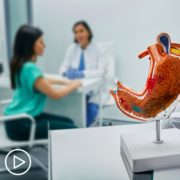What Early Phase Gastric Cancer Trials Are Showing Promise?
What Early Phase Gastric Cancer Trials Are Showing Promise? from Patient Empowerment Network on Vimeo.
What are the latest gastric cancer clinical trial developments in early phases? Expert Dr. Jun Gong from Cedar-Sinai Medical Center shares updates about early phase clinical trials and advice to patients for being proactive in their care.
[ACT]IVATION Tip
“…it’s never wrong to ask if there is any available clinical trial no matter what setting or stage of disease. Whether it’s early stage or advanced stage, it’s always appropriate to ask every provider, ‘Is there a clinical trial that you see may be eligible for me or that you believe to be a better option than certain standard of care options?”
Download Resource Guide | Descargar guía de recursos
See More from [ACT]IVATED Gastric Cancer
Related Resources:

|

|

Do Gastric Cancer Risk Factors Differ Among Hispanic Communities? |
Transcript:
Lisa:
Dr. Gong, can you speak to any early phase trials that have shown encouraging results for stomach or gastric cancer and in particular any of those related to metastatic disease?
Dr. Jun Gong:
So the exciting part about research in stomach or gastric cancer is that there are a lot of ongoing exciting developments in new treatment diagnostics almost every year. And so I think in terms of advanced or metastatic stomach cancer, some of the more exciting trials that have been ongoing and for which results are eagerly anticipated include novel targeted therapies. Here beyond HER2, MSI, EBV PD-L1. We’re looking at novel targets such as claudin. In fact, it is highly anticipated that the first claudin antibody will be available soon for all corners in the U.S. with the FDA approval of such a drug. The compound in question is called zolbetuximab, and here, it requires patients to be tested for claudin on their tumor biopsies. And this is a targeted therapy that’s able to be added to chemotherapy for patients with metastatic gastric cancer.
There are other novel targets such as FGFR2, which is a new target that has…also a targeted therapy that can be added to chemotherapy. This recently demonstrated exciting benefit in a Phase I/II clinical trial. Then we also have novel immunotherapies. We have early phase trials that are now investigating CAR T therapies targeting stomach cancer and specific markers of stomach cancer, including claudin as well. So those are some of the more exciting Phase I ongoing trials in the advanced stomach cancer setting. In the non-advanced or non-metastatic stomach cancer setting, they’re really trying to…the trials have really focused on trying to improve upon chemotherapy, leading up to surgery to derive better cures for stomach cancer. And here, the addition of immunotherapy to chemotherapy is an eagerly anticipated concept that is now playing out in clinical trials and in larger clinical trials and their final results are eagerly anticipated as well.
Lisa:
And do you have an activation tip, Dr. Gong?
Dr. Jun Gong:
My activation tip for this is it’s never wrong to ask if there is any available clinical trial no matter what setting or stage of disease. Whether it’s early stage or advanced stage, it’s always appropriate to ask every provider, “Is there a clinical trial that you see may be eligible for me or that you believe to be a better option than certain standard of care options?” And we as oncologists are always more than happy to look into these clinical trials and really give you guys a breakdown of what trials may or may not be considered.
Sometimes clinical trials, it’s important to realize that for a particular treatment setting, may not be available at our institution, but there are other institutions within the geography. If you are not geographically limited, even across the country where unavailable clinical trials may be available. We generally refer to what we call a master website. It’s called clinicaltrials.gov. And here it’s a very, in my opinion, patient friendly search engine where you can search your diagnosis and look at available clinical trials. And it’s very easy to have this streamlined approach and even filter out some trials that may not be eligible in collaboration with your doctor.






